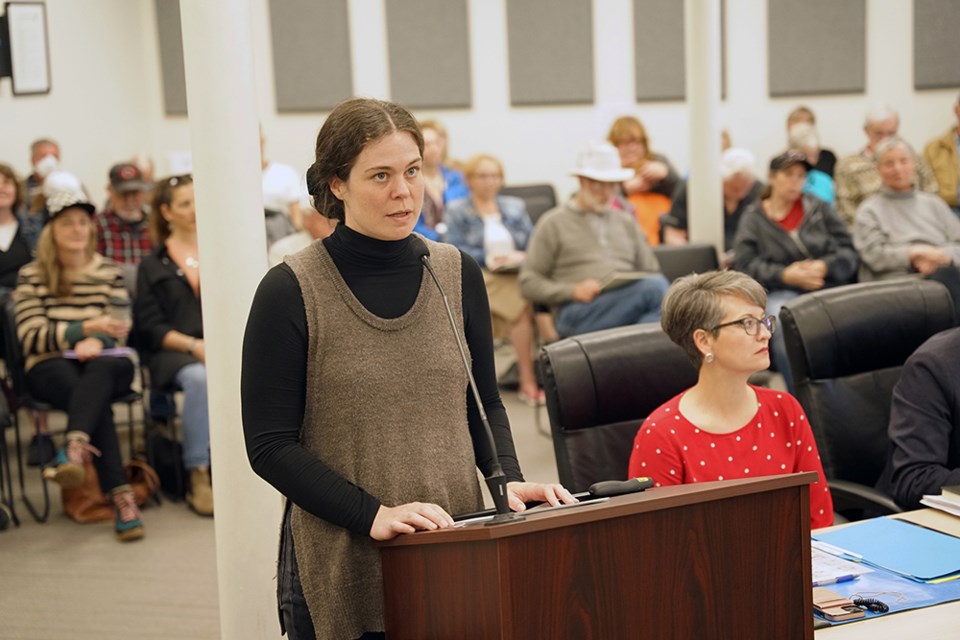City of Powell River councillors received a progress report on homelessness in the community and steps being taken to deal with it.
At the June 4 committee of the whole meeting, Lift Community Services housing services manager Julie Jenkins said she was appearing before councillors to provide an update on homelessness services in qathet region and on the qathet emergency shelter.
She appeared before councillors last December, talking about the need for extreme weather response in the community.
“I’m hoping to report back on what winter has been like at the shelter,” said Jenkins. “As you are all aware, the emergency shelter at 4746 Joyce Avenue opened in January 2022, so it’s been open two-and-a-half years at that location. We offer a space for adults experiencing homelessness to stay overnight and connect with health, housing and social services.”
Jenkins said the shelter currently offers 24-hour service with 20 beds and separate rooms for men and women. There are secure lockers, plus hot dinner and breakfast. There are also low-barrier services, according to Jenkins. She said the contract for the shelter is intended to allow people to access shelter services without too many pre-conditions, knowing that the complexities of the unhoused population in qathet means people coming in may be engaged in active substance use with concurrent mental health conditions.
“We are balancing offering low-barrier services with operating in an urban area and the obligations we have to our neighbours and the wider community,” said Jenkins.
She said she wanted to share some statistics from the December 1, 2023, to May 31, 2024, period around shelter use. She said the frequency of shelter use has been down slightly from the same period the previous year.
During the specified period, there were 2,944 total stays, with 65 per cent being men and 31 per cent from women, with the rest having other gender identities, according to Jenkins. She said there were 72 unique guests in the last six months and the average occupancy was 80 per cent. The shelter was full 9.3 per cent of nights.
“The trends we noticed when the weather is bad is that we tend to be full,” said Jenkins. “When the weather gets nice, people tend to stay outside.”
In the previous year, Jenkins said total stays were slightly higher, with about the same split of men and women. She said there were 98 unique guests, which was significantly higher. Average occupancy was 97 per cent and the shelter was full 58 per cent of the time.
Jenkins said this year, some of the guests were able to find long-term housing or move into treatment facilities.
She said regarding neighbours, Lift has toughened up on rules, which has also contributed to people’s desire to stay at the shelter.
Shelter supplies
Jenkins said that last winter, she appeared before councillors regarding an extreme weather shelter, which was opened in January 2024, to provide temporary shelter in the Community Resource Centre, only when extreme weather conditions indicated it, and when the regular shelter was expected to be full. There were cots and blankets and a room divider to separate men and women. There was also secure storage monitored by staff, with hot dinner and cold breakfast served. Lots of community donations were dropped off, added Jenkins.
The shelter was open for eight nights during the winter when it was extremely cold. There were 22 stays, said Jenkins. There were 17 male stays and five female stays. The coldest night was -11 degrees Celsius.
“I was thinking how grateful I was that the service was open that night,” said Jenkins.
She said a big conversation that came up last winter when the facility was being discussed was how to balance offering these services with neighbours close by.
“The feedback we have received from neighbours on both sides was that there had been a significant improvement,” said Jenkins, after measures have been put in place to lessen problems.
A meeting was held involving senior Lift staff, the RCMP, the city and BC Housing to discuss security solutions. What was learned from that conversation is BC Housing is not funding security for shelters or supportive housing, said Jenkins, adding that BC Housing recommends increasing staffing. Lift has a proposal into BC Housing to do that.
A new fence has been built at the emergency shelter site, which goes all along the property line of Dr. Ashok Varma’s dentistry office property line. That has prevented the flow of pedestrian traffic, said Jenkins. The project was funded by BC Housing.
Jenkins said Lift is having ongoing meetings with partners about short and long-term solutions for the ongoing homeless services in the community. She said long-term housing is what is needed.
“I would emphasize that shelters are short-term solutions,” said Jenkins. “We see much better outcomes when people are moved into permanent housing. In the meantime, shelters are what we have and we are trying our best to work with partners to make them successful in our community.”
Join the Peak's email list for the top headlines right in your inbox Monday to Friday.



